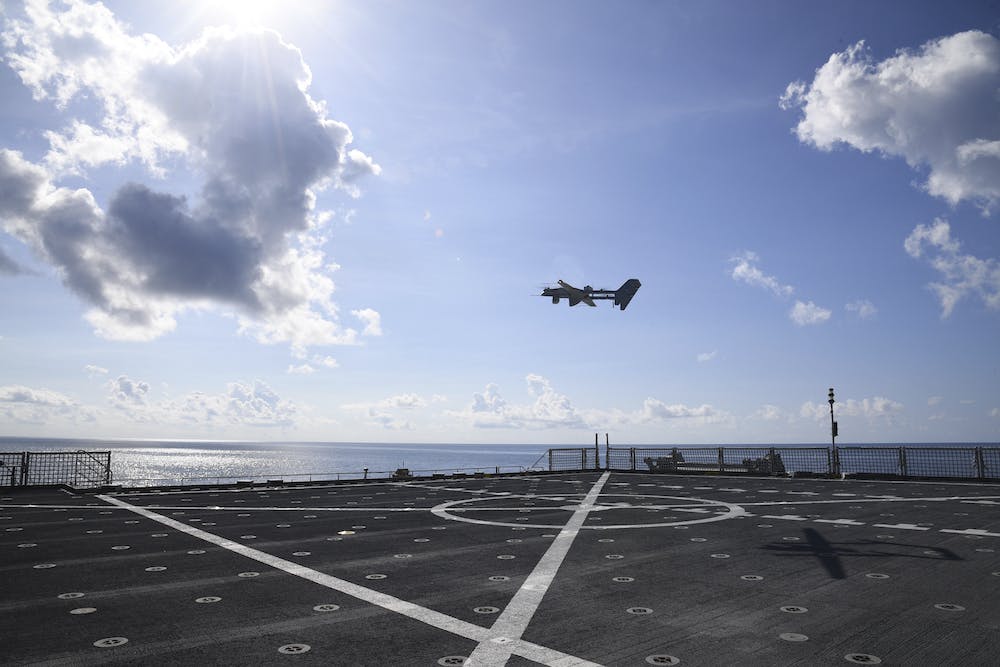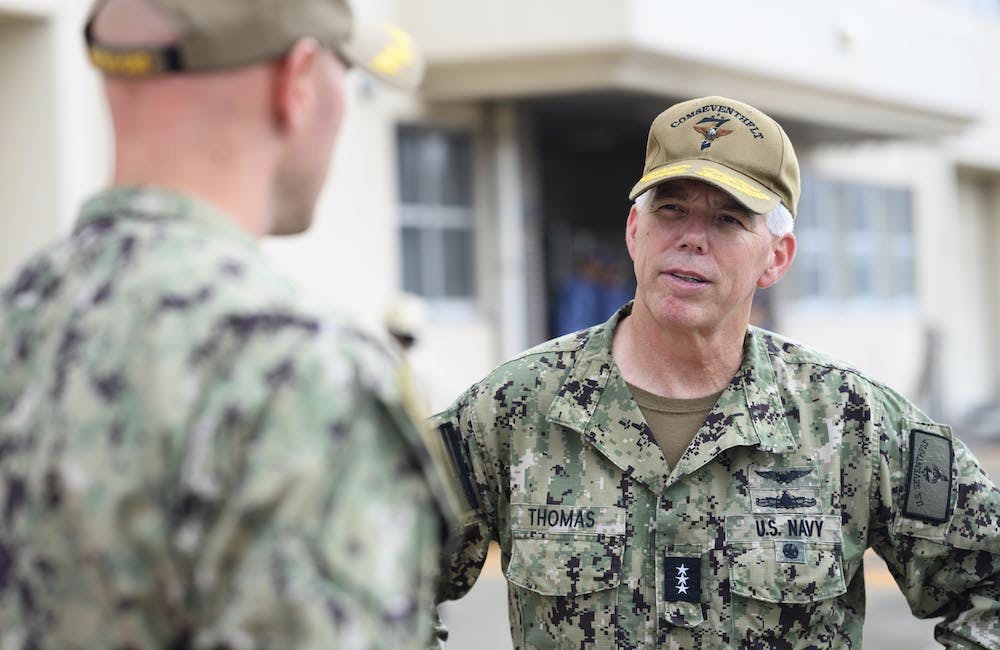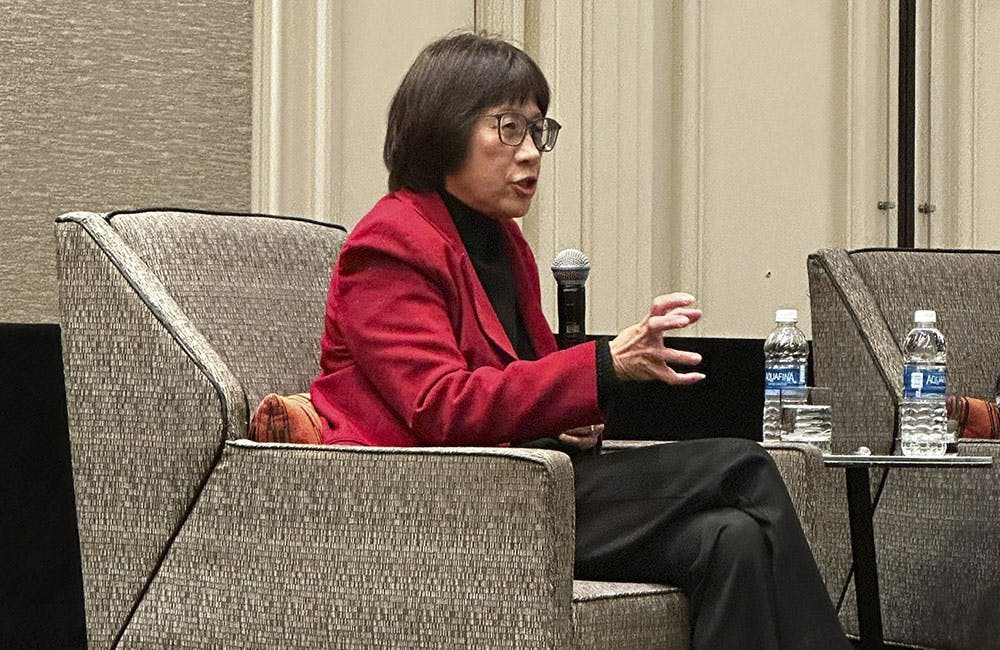Mock Invasion of Taiwan Marks Special Operations Tactics Shift
U.S. Army Special Operations Command sees information warfare as a competitive advantage in future conflicts.

Two MH-47 Chinooks flew over Fort Bragg, North Carolina, and soldiers slid down a rope onto a concrete building. Then gunfire began.
U.S. Army Special Operations Command (USASOC) conducted its week-long annual capabilities exercise in April, only this time, soldiers were involved in a new exercise scenario: defending Taiwan against a potential Chinese invasion.
Instead of carrying out the exercises in East Asia, Chinooks full of spectators landed at Range 68 in Fort Bragg where spectators observed activities like conducting evacuations, executing psychological operations and combat operations.
The exercise comes amidst growing geopolitical tensions across the Indo-Pacific region and highlights the importance of information warfare in future conflicts with near-peer adversaries.
The 2023 National Defense Strategy describes the People’s Republic of China as “the most consequential strategic competitor” to the U.S., and the Pentagon has been actively preparing to counter China amid growing concerns of a possible invasion of Taiwan. The Pentagon recently gained access to four new bases in the Philippines for training and equipment storage purposes.
While there are a great number of lessons learned from Russia’s invasion of Ukraine, the most significant macro lesson is the importance of information operations, according to Lt. Gen. Jonathan Braga, commander of USASOC.
“Somehow, through successful information operations, the world cares about Ukraine. I mean, we have Switzerland giving weapons away, right? Finland and Sweden desire to join NATO, the exact strategic objectives Putin was looking to avoid happened or happening,” Braga said. “When you have the world coming together and providing resources, supplies … that’s the power of information ops.”
“I used to think force protections is ‘give me a bulletproof vest, give me a bulletproof vest, give me a pistol,'” he added. “Modern day force protection is digital force protection — and your digital dust, and your thumbprint, and your vulnerabilities that can be leveraged against by these nation state adversaries much different than the terrorists we’ve been facing.”
The increasing role of cyber and space in current conflicts is pushing the military services to modernize quickly. Last year, USASOC said it was experimenting with different ways to add cyber and space capabilities and unveiled an “influence triad” framework, which fuses the military services’ special operations, cyber and space capabilities to deter adversaries.
USASOC works with the U.S. Space Force, U.S. Space Command, the National Security Agency and U.S Cyber Command to develop and add cyber and space capabilities to special operations in preparation for large-scale combat operations, Braga said.
“It’s a powerful tool that provides options for geographic combatant commanders and the National Commandant Authority, and it means everything from changing the form factor of a thing to make it a smaller thing to complimentary to deterrence theory,” Braga said. “If you said triad, you thought subs and missile silos and bombers. That’s the same thing we are hoping with this triad … it’s forces that contribute to a larger deterrence theory.”
Information Warfare in Large-Scale Combat Operations
USASOC, headquartered in Fort Bragg, is home to the 1st Special Forces Command, 75th Ranger Regiment, U.S. Army Special Operations Aviation Command, and U.S. Army John F. Kennedy Special Warfare Center and School.
At any given moment, there are at least 3,000 people deployed in different countries.
The 75th Ranger Regiment is currently deployed in Sudan, assisting with evacuation efforts, along with psychological operations and civil affairs. USASOC is also contributing to intelligence-sharing for threats coming out of the Middle East and providing intelligence support to Ukraine.
Approximately 12,000 students go through a wide range of courses at the John F. Kennedy Warfare Center and School, and there are at least 3,000 enrolled in training programs at any given time.
“If you take the current conflict in Ukraine, we’re ultimately trying to change and contribute to changing Putin’s behavior. We are trying to prevent that from escalating, stop the fight and get to the negotiating table, but we try to change behavior,” Braga said.
Two psychological operations groups within USASOC aim to persuade adversaries not to carry out operations and to influence the relevant population. Psychology operations groups are learning from campaigns run by Ukrainian psychological operation forces.
Almost 3,000 Russian service members have utilized the ongoing “Call Home” campaign, which consists of soldiers calling their families to break free of the information bubble Russian forces create around their soldiers on the front lines.
To spread messaging, Ukraine has relied upon the Vietnam-era leaflet distribution method, but increasingly focuses on the cyber domain. For example, some of the reserve force has been recruited into the Ukrainian cyber force to disseminate messaging electronically.
“We are talking about the shift from the coins of the counterinsurgency, which is a great power competition. They [Ukraine] are kind of dealing with the same shift as well there. They are going from kind of a free internet area to a digital competition,” said a 4th Psychological Operations Group analyst, whose name cannot be used due to the nature of their job.
This is just one of the many lessons USASOC has learned from Ukraine.
“Everyone is watching the lessons learned from Ukraine and saying, ‘Well, what if it’s us next?’ and we’re transregionally applying those lessons learned,” Braga said.
A psychological operations NCO, whose name will not be disclosed due to the nature of their job, said information advantage will be critical to winning future conflicts.
“The information environment — it can seem overwhelming at times, just the sheer size of it, the amount of information going in and out of it,” they said. “How do you navigate all of that and create order out of chaos, so that you can gain the informational advantage over an enemy that does not operate with the same restrictions and rules that you’re going to have to operate under? We have to innovate today because tomorrow is too late.”
This is a carousel with manually rotating slides. Use Next and Previous buttons to navigate or jump to a slide with the slide dots
-

Navy Plans to Revolutionize How It Buys a New, AI-Enabled Unmanned Fleet
The AI-enabled cooperative combat aircraft program will focus more on sensors and systems than platforms, Navy leaders said.
4m read -

Navy Leaders Say Project Overmatch Ahead of Delivery Timelines
Officials compared the service's CJADC2 initiative to the Manhattan Project and said over-the-shelf technology will not suffice.
4m read -

Sea-Air-Space: How Autonomy Supports NOAA’s Mission to Map Uncharted Waters
NOAA's Office of Marine and Aviation Operations is using on onboard tools and technology to maintain maritime power.
6m watch -

DOD's Heidi Shyu Points to Joint Capabilities for AI Agility
The department is targeting rapid prototyping and joint exercises as it fields critical technology for warfighter readiness.
5m read









